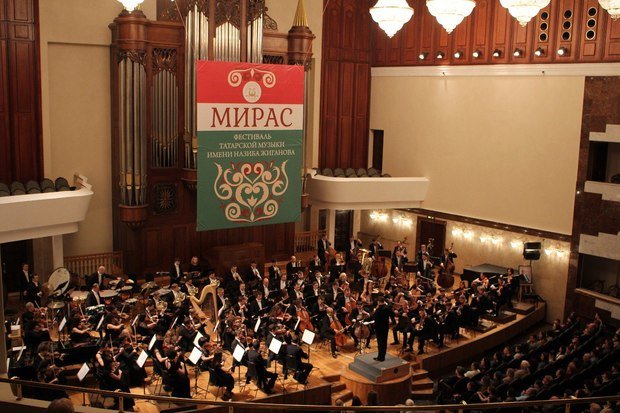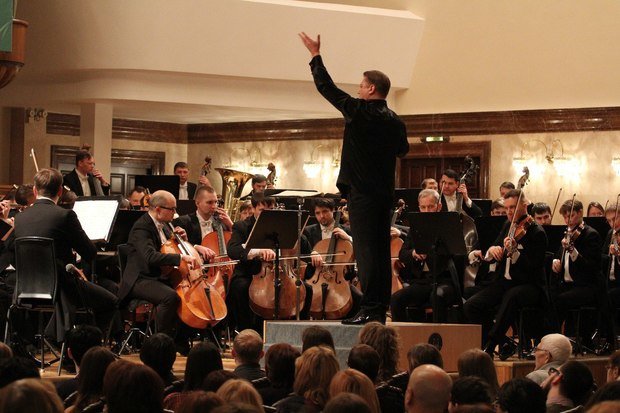Alexander Sladkovsky: ''I see a full house in front of me''
Contrary to the opinion of skeptics who claim that the classical heritage of the Tatar music can be interesting only to a narrow circle of listeners, the first concert of the third festival Miras was played to a full house. All tickets have been sold for the next concerts as well. Read the details in the material of Realnoe Vremya.
''There should be both things''
Miras is translated as ''heritage' 'from the Tatar language, the aim of the festival that has been held in the Saydashev State Great Concert Hall for the third time is to return to the listeners the Tatar classics, to make it popular, often played. The festival originated in the bowels of the Tatarstan National Symphony Orchestra thanks to the initiative of artistic director and chief conductor of the orchestra Alexander Sladkovsky.
Before the beginning of the first concert of the festival, Alexander Sladkovsky and art director of the fest Professor Dulat-Aleyev communicated with journalists. ''Miras, in my opinion, is gaining momentum, and our idea of preserving the heritage in the field of national academic music, in the field of the composing school of Tatarstan, it has been declared and with great success is moving forward. I am always interested in the result, I see a full house, and for me it is an indicator that we are on the right track,'' Alexander Sladkovsky commented on the festival.
Art director of the festival Professor Vadim Dulat-Aleyev is one of the components of the success of the fest because Vadim Robertovich is, perhaps, equal to none in this area today in Tatarstan. The results of his surveys are well-designed, balanced programmes of the festival, which open to listeners unjustly forgotten treasures of the national music.
''What will sound on the stage is the result of the work. The work begins with that we look for where these notes are. This happens every festival. Some works had not performed for 50-60 years. I better not say how they are stored in the archives, it happens in different ways. There is a large amount of work that is not visible. Our Miras also has a rough, working component. And only after that it is on the stage. And here our wonderful orchestra and Maestro Sladkovsky perform it. It is always interesting for me how these works would sound in the interpretation of Maestro Sladkovsky. Miras is not only an event with a historical bias, it is also an artistic event. It is a real celebration of the Tatar music. It will sound in a great live performance. We have expanded the scope of the festival and trying to present as much music as possible. In the current festival, there is a larger number of performed composers,'' said Vadim Dulat-Aleyev.
During the media scrum, there was a strange question of a journalist, who was clearly not au fait with the opened festival, who asked Dulat-Aleyev that, perhaps, it would be better to promote not the festival of pop music Uzgeresh Zhile but Miras. The answer of Professor Dulat-Aleyev was unambiguous: ''It's completely different things. To close one channel to open the other? We shouldn't do that.''
Indeed, as the classic advised us, it is necessary to judge by the laws of the genre. The Tatar musical culture is diverse, it should be paid tribute in it to academic music, folklore, as well as good pop song. Well, trying to play the creators of two different festivals off against each other is a thankless task. Despite all the dissimilarities, the polarity of the genres, these festivals have a definite commonality — they are both, ''having shoveled tonnes of ore'', restore for the Tatar people their unjustly forgotten musical masterpieces. As a result, the listener wins.

In memory of Fuat Mansurov
The first concert of Miras festival was dedicated to the memory of Fuat Shakirovich Mansurov, who for many years led the Tatarstan State Symphony Orchestra and paid special attention to performance of the Tatar music by the orchestra. ''Thanks to hearing of Mansurov, almost all Tatar music of that time went on stage,'' said Vadim Dulat-Aleyev.
The portrait of Fuat Mansurov was watching the audience from the stage, composer Rezeda Akhiyarova, opening the concert, spoke about his contribution and thanked the orchestra and its artistic director Alexander Sladkovsky for their attention to the works of Tatarstan composers.
The first concert of Miras opened with the overture to the ballet by Rashit Gubaydullin Kisekbash — bright, imaginative, immediately introducing listeners to the diverse atmosphere of the hay market described by Gabdulla Tukay. Kisekbash was followed by three dances from the ballet by Enver Bakirov Vodyanaya that reminded us the world of Tatar tales and legends, the well known story about the magic comb and Su-anasy.
The works of composers of other generation were presented by fragments from The Golden Horde by Rezeda Akhiyarova, the ballet that for already several seasons has been successfully performed on the stage of the Tatar State Academic Opera and Ballet Theatre named after Musa Jalil and was shown on the channel Mezzo. With a stunning expression the orchestra performed fragments from The Golden Horde to then appear as if in a new form, performing the complex, ambiguous music by Leonid Lubovsky. There were performed the fragments of the ballet The Tale of Yusuf, which won a State Prize of the Russian Federation.

Indeed, the concert could not do without the works of the author, after whom Miras is named: Sabantuy by Naziba Zhiganov in the interpretation of Alexander Sladkovsky – it is a large-scale series of successive pictures, where the idyll of rural morning in a village, as if frozen in anticipation of the holiday, gives way to Sabantuy — bright, temperamental, with intertwining folk melodies, where strength and agility coexist with savvy and humour.
The interpretation by Alexander Sladkovsky performed in the first festival evening of Tatar academic music works was gentle, heartfelt and metaphorical. However, it could not be otherwise. The quality of performance is indisputable. But there is also human, civil aspect.
Every now and then the words of Dulat-Aleyev were arising in the memory that many of the works had not been performed for five or six decades. And it's not even sad — it's terrible. It is unlikely that anyone would argue, but the work done by artistic director of the Tatarstan symphonic orchestra Alexander Sladkovsky and Professor Dulat-Aleyev, when the audience was returned mainly unfairly forgotten masterpieces, deserves the highest praise. And just a great deal of human respect.